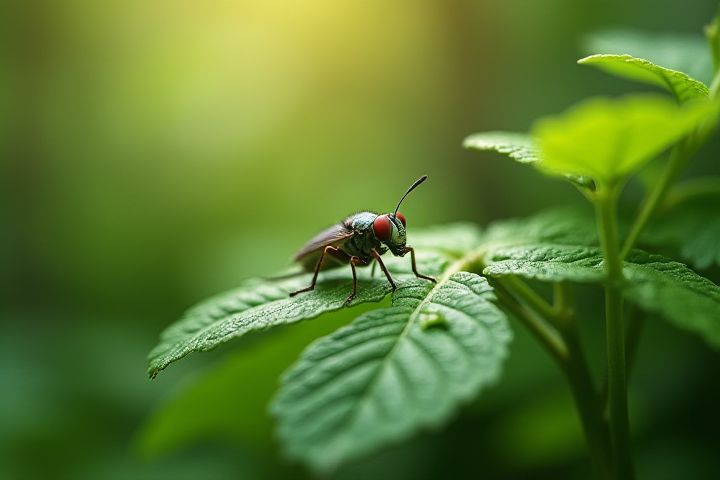
Environmental conservation in Nigeria is critical due to the diverse ecosystems found within its borders, including tropical rainforests, savannas, and wetlands. The Niger Delta, rich in biodiversity and natural resources, faces significant threats from oil spills and deforestation, making conservation efforts essential for sustainable development. Various organizations, both local and international, are actively involved in reforestation projects and wildlife protection initiatives to restore habitats and promote biodiversity. Your participation in community clean-up programs or sustainable farming can directly impact the preservation of Nigeria's natural heritage. The integration of traditional ecological knowledge with modern conservation strategies is vital for the resilience of Nigeria's environment against climate change and human activities.
Biodiversity hotspots
Nigeria is home to several biodiversity hotspots, including the Niger Delta and the mountainous regions of the Jos Plateau, which harbored a rich array of flora and fauna. Diverse ecosystems such as tropical rainforests, savannas, and wetlands support numerous endemic species, making conservation efforts crucial for maintaining ecological balance. Organizations and local communities are increasingly engaged in sustainable practices aimed at preserving these hotspots, tackling threats like deforestation and habitat destruction. By promoting awareness and implementing conservation initiatives, you can contribute to the protection of Nigeria's invaluable biological heritage.
Deforestation challenges
Deforestation in Nigeria poses significant environmental challenges, threatening biodiversity and contributing to climate change. Approximately 350,000 hectares of forest are lost annually due to logging, agricultural expansion, and urbanization. This degradation impacts wildlife habitats, reduces carbon storage capacity, and disrupts local communities' livelihoods that rely on forests for resources. Engaging in sustainable forestry practices and promoting reforestation initiatives are crucial strategies for mitigating these challenges and preserving Nigeria's natural heritage.
Oil spill impacts
Oil spills in Nigeria have devastating effects on the environment, particularly in the Niger Delta region, where the rich biodiversity is severely threatened. Contaminated soil and water lead to the loss of agricultural productivity and fishery resources, disrupting local livelihoods and food security. The health of communities is compromised due to exposure to hazardous substances, resulting in long-term health issues. Your participation in conservation efforts, such as supporting cleanup initiatives and advocating for responsible oil extraction practices, can significantly contribute to the restoration of affected ecosystems.
Waste management issues
Environmental conservation in Nigeria heavily emphasizes effective waste management practices to combat pollution and promote sustainability. The country grapples with challenges such as inadequate waste disposal infrastructure and limited public awareness, leading to significant environmental degradation in urban and rural areas. Implementing integrated waste management systems, including recycling and composting initiatives, can significantly reduce landfill usage and enhance resource recovery. You can contribute to these efforts by engaging in community clean-up programs and supporting local recycling initiatives, fostering a cleaner and healthier environment.
Erosion control efforts
Erosion control in Nigeria is a critical aspect of environmental conservation, aimed at mitigating soil degradation and preserving agricultural productivity. The country faces severe challenges due to deforestation, unsustainable farming practices, and urbanization, which exacerbate soil erosion and threaten food security. Various initiatives, such as reforestation and the construction of terraces, are being implemented to protect vulnerable landscapes, enhance biodiversity, and improve local livelihoods. Community engagement and education on sustainable agricultural practices are vital in fostering a collective responsibility towards preserving Nigeria's natural resources.
Protected areas establishment
Nigeria's commitment to environmental conservation emphasizes the establishment of protected areas, crucial for preserving biodiversity and ecosystems. National parks, wildlife reserves, and game reserves are integral to safeguarding endangered species such as the Cross River gorilla and riverine ecosystems. These protected areas also offer opportunities for ecotourism, promoting sustainable economic development while fostering local community involvement in conservation efforts. Strengthening legal frameworks and enhancing management strategies for these regions will ensure the long-term sustainability of Nigeria's natural heritage.
Wildlife conservation initiatives
Wildlife conservation initiatives in Nigeria emphasize protecting endangered species and preserving natural habitats. The country is home to a rich biodiversity, including species like the African Elephant and the Cross River Gorilla, both facing significant threats from poaching and habitat loss. Community-based conservation programs involve local populations in protecting these species, creating economic incentives through ecotourism and sustainable practices. By supporting these initiatives, you contribute to maintaining Nigeria's ecological balance and ensuring the survival of its unique wildlife for future generations.
Renewable energy promotion
Nigeria's commitment to environmental conservation is increasingly centered around the promotion of renewable energy sources, such as solar, wind, and hydroelectric power. This initiative aims to mitigate the impact of climate change and reduce dependence on fossil fuels, which have been detrimental to the ecosystem. By investing in renewable energy technologies, Nigeria seeks to enhance energy access for its population while promoting sustainable development practices. You can contribute to these efforts by advocating for policies that support clean energy initiatives and by utilizing renewable resources in your community.
Climate change adaptation
Environmental conservation in Nigeria emphasizes climate change adaptation strategies to safeguard biodiversity and sustainable development. Initiatives include reforestation, wetland restoration, and the promotion of sustainable agricultural practices aimed at enhancing resilience against climate effects. Education and community engagement are essential in fostering awareness and encouraging local participation in conservation efforts. By prioritizing these adaptive measures, Nigeria aims to protect its rich ecosystems while addressing the challenges posed by a changing climate.
Community involvement
Environmental conservation in Nigeria emphasizes community involvement as a key strategy for sustainable development. Local communities are encouraged to participate in conservation efforts, fostering a sense of ownership and responsibility towards natural resources. Initiatives such as reforestation projects, wildlife protection campaigns, and sustainable agricultural practices are implemented with community engagement at their core. This grassroots approach not only enhances biodiversity preservation but also promotes social cohesion and economic resilience among communities.
